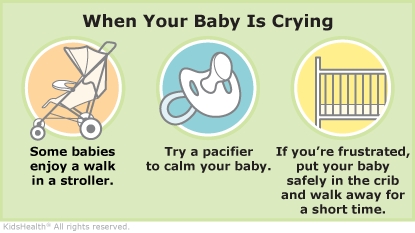Some babies cry more than others. Some might cry up to a total of 2–3 hours in a day. But that doesn't always mean there's a problem. Because your baby cried more than you felt was OK, the health care provider carefully checked your baby and didn't find anything wrong. It's safe for you to care for your baby at home.




You think your baby is injured or that someone might have hurt your baby.

Can you spoil a crying baby? No, babies are too young to be spoiled. Babies often communicate with crying, which tells caregivers that a baby needs attention. When a caregiver comforts a baby, it helps the baby feel secure. Trying to soothe a crying baby is the right thing to do.
Does my baby have colic? When a healthy baby cries for more than 3 hours a day, more than 3 days a week, a health care provider may say the baby has colic. Babies with colic don't have any known medical problems, and they eat and grow well. But they cry in spells that often happen at the same time of day, usually in the early evening, and might be hard to soothe. The calming tips recommended above can help whether a baby's crying pattern fits the definition of colic or not. Babies who cry a lot usually get calmer after 3 to 4 months of age.
What else can I do?